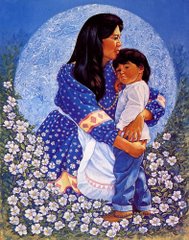Oh my goodness here we go again! Another article by Peter Duffy displaying his ignorance. Mr Duffy is in desperate need of some basic education in First Nations history, traditions and justice.
And I am sorry to say Daniel Paul, though a Mi'kmaq person and a Mi'kmaq historian is apparently NOT knowledgable of other Native Nations.
Banishment is a traditional form of Native justice in many Native Nations in North America which is still utilized today in some communities with the blessing of our Canadian and US justice system.
Please post your comments to both of these article! Let this man know how we feel about the things he has said. I will make sure that he receives all your comments.
Drowning of native child speaks volumes
By Peter Duffy August 19, 2007
IF YOU WANT an inkling of just how far some of Canada’s aboriginal people have been separated from their history, look no further than a recent tragic news item out of northern Manitoba.
A youngster on a reserve there drowned as a result of bullying by three other native children. The victim was six; his tormenters were seven, eight and nine. The bereaved mother is demanding those responsible be literally exiled from the community.
Once upon a time, such an incident would have been beyond belief, according to Dan Paul, an outspoken Halifax author and native activist. Not only that, but the call for retribution would also have been most unusual.
Traditionally, says Dan, native people had little need for punishments because respect ruled in the community. "The values of most First Nations societies are of love and a tradition of treating one another as equals," says Dan.
Or at least, those used to be the values. Things changed on many fronts with the arrival of the Europeans and their ways.
Aboriginal people were taught early to honour themselves and all those around them, family and peers alike. It used to begin as children, and it stayed with them all their lives.
Today, too many of those same youngsters are losing their compass. Witness the drowning in Manitoba; witness the fact that suicide among young natives is at epidemic proportions in some regions.
When we hear of native children losing their way, we should not only weep, but also despair at the deeper implication. Because it means the grownups have already lost theirs.
Dear natives: Let’s find a better way
2007-07-01, Opinion By Peter Duffy in the Halifax Herald
WHAT ON EARTH is it that aboriginal people want from the rest of us?
Or, is that what they’re after — the earth, maybe followed by the moon and then the stars?
It’s certainly starting to seem like it. These days, every time you turn around, there’s a new problem that needs fixing.
And the clamour isn’t going away. If anything, it’s getting louder and closer, to the point native protests are becoming as much a national institution as, well, as Canada Day itself.
Friday’s day of action was intended to make us aware of native poverty; poor health care; lack of education; substandard housing; and lack of job opportunities. Not to mention real or imagined past injustices.
It came with menacing overtones of violence that left a bad taste in the mouths of many people, even non-natives who aren’t necessarily unsympathetic to the cause.
So what do they want?
Is it the power to run their own affairs? How can that be? Ottawa and the provinces have already surrendered authority over such key responsibilities as education, land management, housing, economic development and child welfare.
Is it more money? Let’s hope not. Taxpayers are already appalled at the river of money disappearing into reserves and other native institutions with little or nothing to show for it. Given all those billions over the years, how can there be one substandard house, one sick person, one unemployed individual, in any aboriginal community?
Is it more land? Good grief, hardly a month seems to go by that we aren’t reading about a new land settlement involving billions of dollars, vast tracts of land and mineral rights. Does the name Nunavut ring a bell? And let’s not forget the prime minister has promised a fast-track program for outstanding claims, along with a quarter-billion dollars annually to make it work.
Is it redress? What about that $2 billion settlement for survivors of the residential school system? Surely that’s pretty good amends for some past wrongs.
It seems to be all this, and more. On and on, with no end in sight, and that’s the whole point.
It’s time the rest of us had our own day of protest, to let native people and Ottawa alike know we can’t go on like this.
Let’s stop propping up a system that isn’t working and find a better, fairer, more reasonable way. And while we’re at it, let’s make it clear to native people that their way isn’t working, either. No matter how many barricades they throw up.
